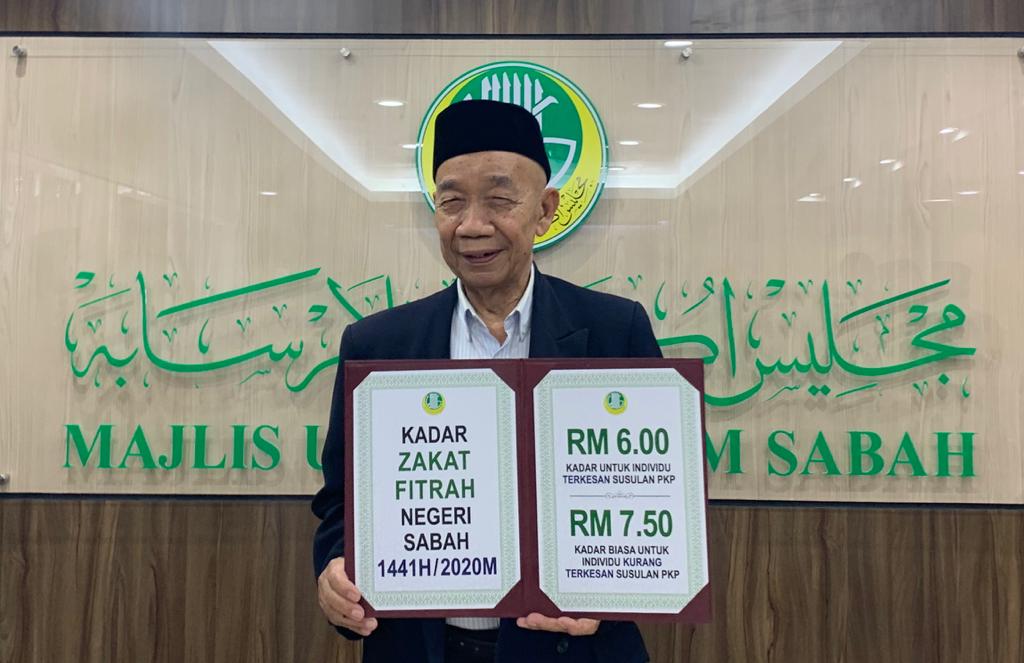
Hasbullah showing the amount of zakat fitrah payment for Ramadan 2020.
KOTA KINABALU: Zakat fitrah drive-through payment counters are amongst the Sabah Islamic Religious Council’s (MUIS) proposals to facilitate Muslims in fulfilling their obligations during the Movement Control Order (MCO) period this Ramadan in Sabah.
MUIS Zakat and Fitrah Division deputy chief assistant secretary Iwansuzairie Hari said besides its online payment methods, various suggested initiatives had been submitted to the Sabah National Security Council and Sabah State Health Department for approval on April 16.
He hoped to hear word of approval before Ramadan to facilitate MUIS Zakat Fitrah collection operations during the Islamic holy month.
Iwansuzairie said some 20 locations have been identified thus far with the insights of the Royal Malaysian Police (PDRM) to have the drive-through counters at roads frequently used by motorists without causing road congestion in the future.
He added the number of counters could be increased to 40 with good feedback from the public.
Besides the zakat fitrah drive-through payment counters, Iwansuzairie said MUIS had also proposed for a mobile amil method, allowing its 1967 amil representatives in Sabah to be cleared for house to house zakat fitrah payment collection in Sabah.
Another proposal is the amil static, allowing individuals to make payments at the amil representatives’ houses.
Besides that, MUIS’ proposals include opening of its zakat fitrah payment counters at key locations such as selected Fire and Rescue Department, and opening of six respective offices for zakat fitrah collection in Sandakan, Kota Marudu, Keningau, Kota Kinabalu and Tawau.
He added that the proposal also included safety measures to safeguard the amil representatives and the public’s health in order to break the coronavirus disease 2019 (Covid-19) chain in Sabah.
Meanwhile, MUIS has set two special zakat fitrah rates this Ramadan to further help those affected by the Movement Control Order (MCO).
Its chairman, Datuk Seri Hasbullah Mohd Taha, said the sums are RM6 per person for those affected by the MCO and RM7.50 per person for those less affected by the MCO.
He added the organization had made the decision on April 13 through a zakat fitrah payment method implementation meeting that was chaired by Sabah State Government Mufti Sahibus Samahah Datuk Ustaz Bungsu @ Aziz Jaafar.
“This is intended to ease the burden of Muslims to fulfill the obligations. The setting of these two zakat rates is based on the rice price of 2.7kgs of community rice (RM7.50) that is consumed by a large number and a smaller number of community (RM6) in this state,” said Hasbullah.
The MUIS chairman reminded capable Muslims, especially heads of families, to make the zakat payments through accredited amil representatives and also called upon them to do the payments using online transactions such as online banking channels, online payment gateways like Snap N Pay, MYEG and Boost to MUIS to help stop the Covid-19 infection during the MCO period.
“It is hoped that the declaration of these two zakat fitrah rates will help ease the burden of Muslims in the state to fulfill their obligations,” he said.
MUIS collected RM9,772,966 zakat fitrah from 1,396,138 individuals last yesr, a 29,215 or 2.1% increase compared to the previous year in Sabah.
Meanwhile, RM75,836,023 amount of zakat property was collected from 54,929 individuals or companies in the state last year.
The total zakat fitrah and zakat property amounted to RM85,608,989.96.
This year, MUIS has allocated RM9.4 million, of which RM8.2 million will be distributed to 42,177 asnaf fakir, the poor, and mualaf to help them usher Hari Raya Aidilfitri with joy.
Meanwhile, RM1.2 million will be distributed to 1,967 amil fitrah representatives as amil wages for collecting and distributing zakat fitrah throughout this coming Ramadan.
In addition, 39 amil representative coordinators have been elected to be on duty this year.
MUIS selected the amil coordinators and representatives amongst Sabah Islamic Religious Affairs (JHEAINS) officers, public servants, Kariah imams, village heads, community leaders and qualified individuals.
